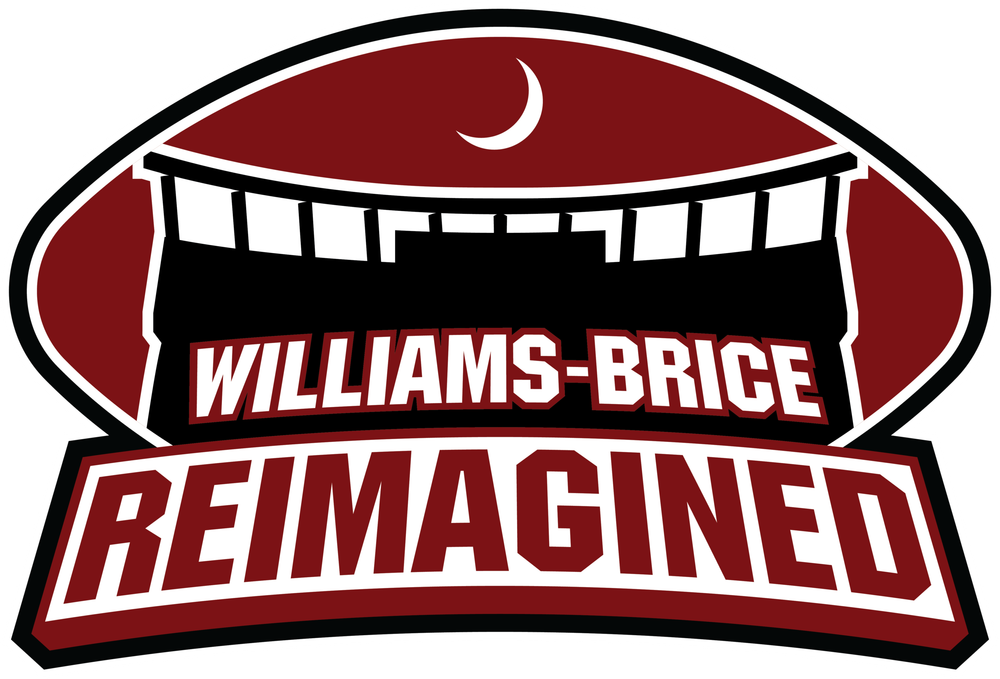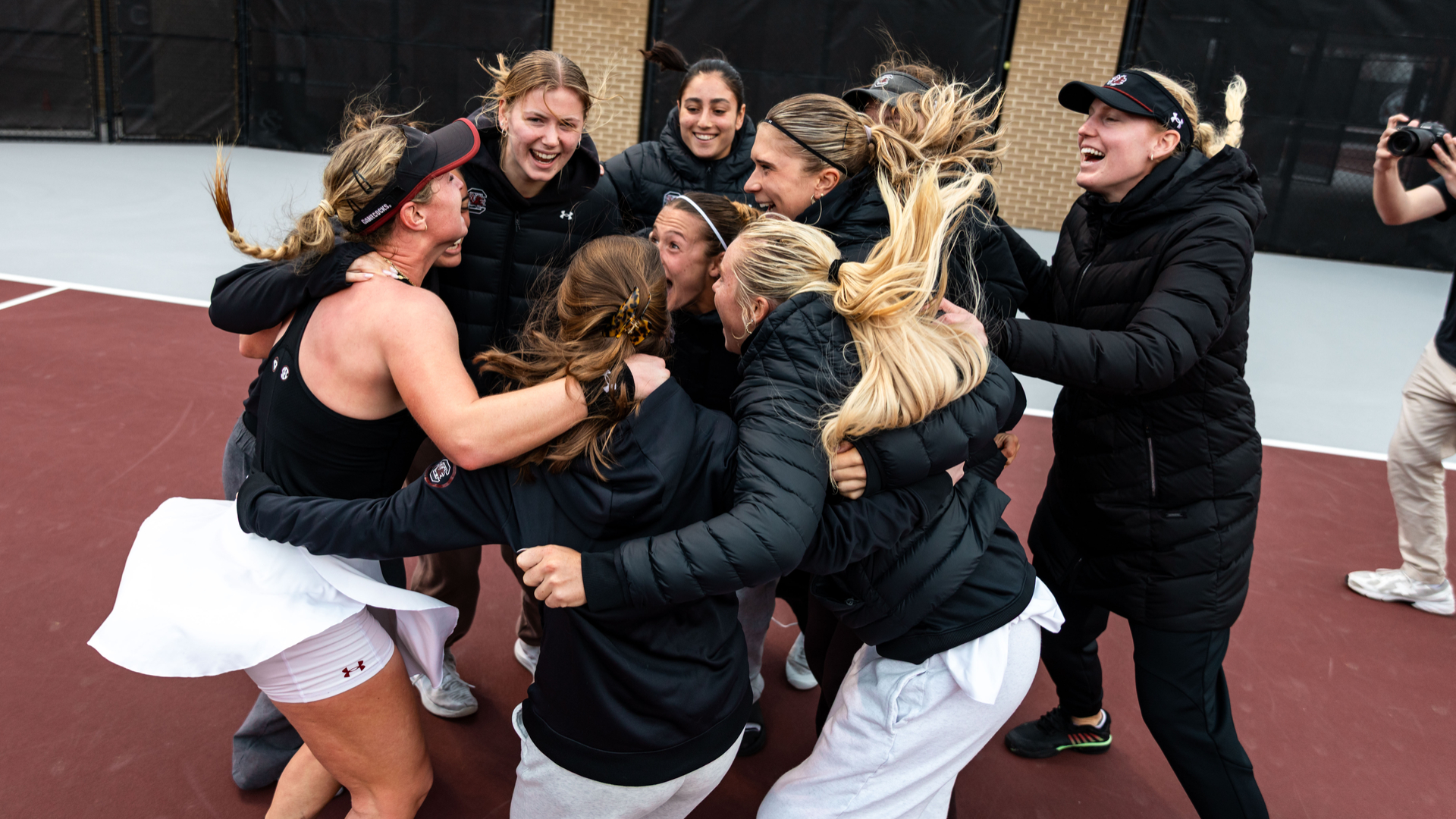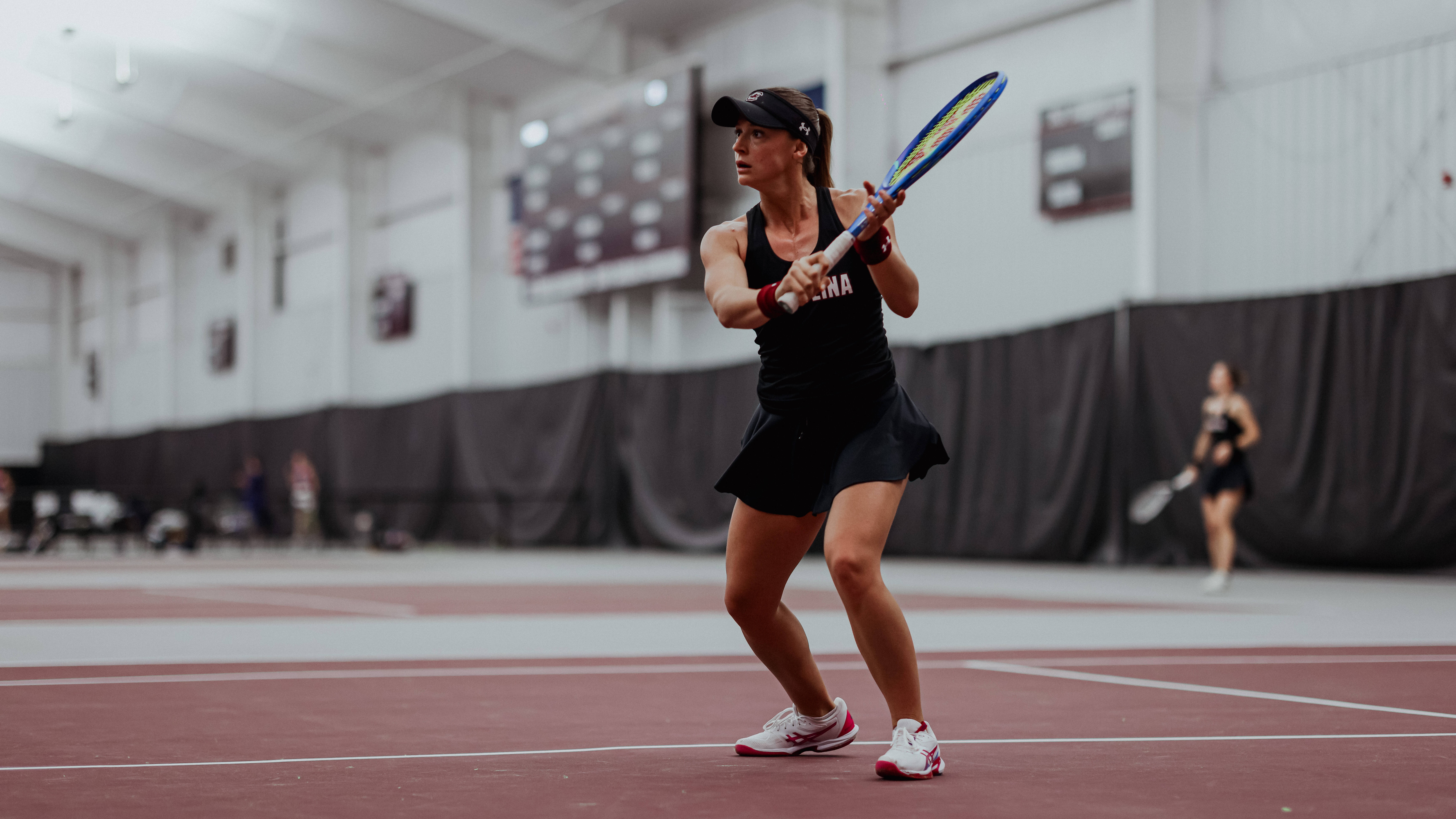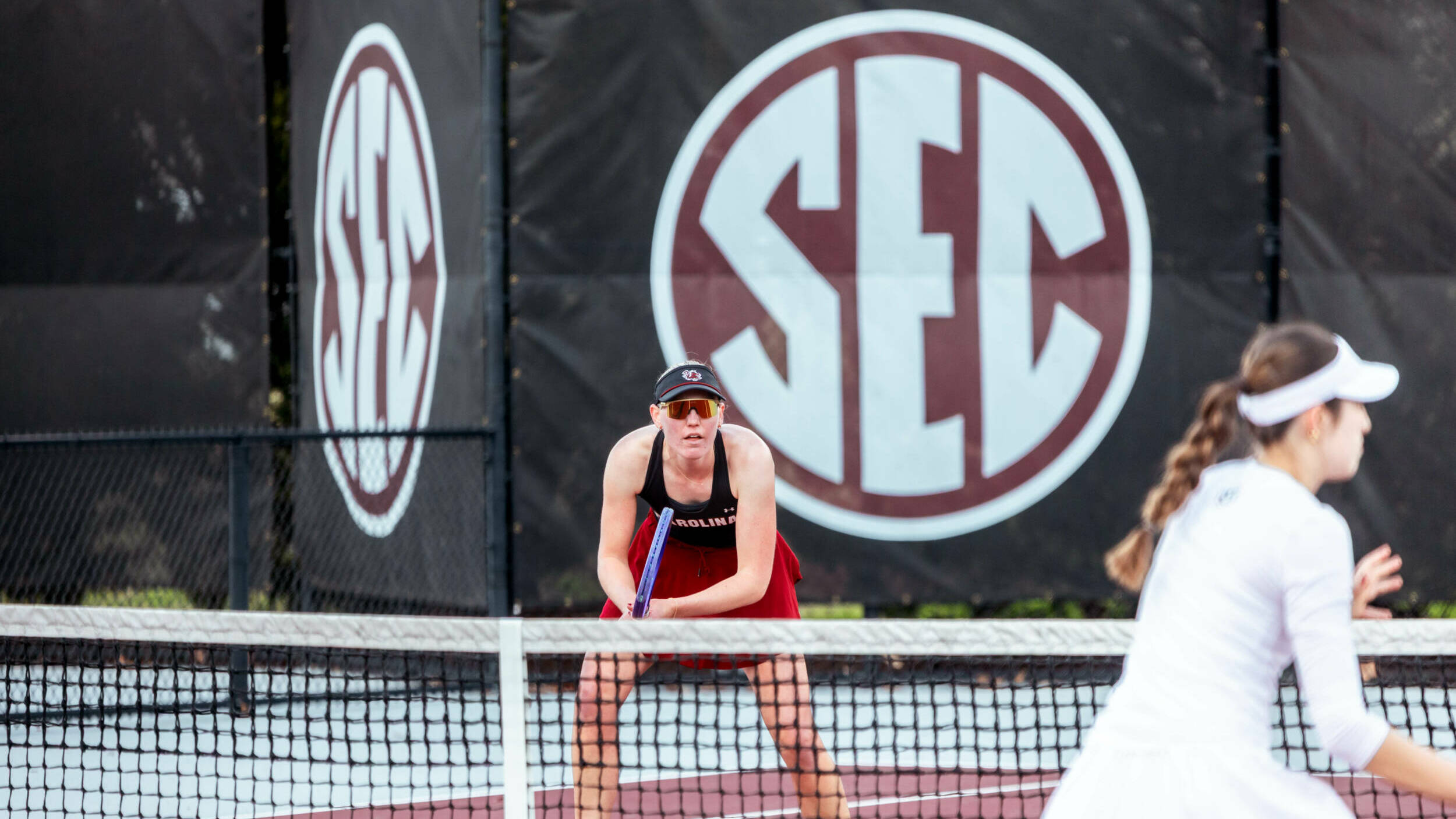
Blevins Stays Focused After Personal and Family Setbacks
April 15, 2015

Meghan Blevins isn’t shy about displaying intensity on the tennis court. The senior from Charleston has a fighting spirit that runs in the family. She has not only watched both of her parents overcome cancer in recent years, but she has also worked through an eating disorder.
“My parents having cancer puts things in perspective,” Blevins said. “Losing a tennis match isn’t that big of a deal compared to that. When I transferred here, I had to write a paper about what pushes us and what makes us play the way we do. Mine was about my mom and dad. I feel like I should be honored to go out and play for them. It was hard at the time to be on the court.”
While her parents fought their battles, Blevins was also conflicted with how she thought an athlete should look. A lean 5’5″ tall, she wasn’t exactly a candidate for someone who needed to lose a few pounds either.
“My proper weight would be between 125 and 130 pounds,” Blevins said. “I got down to about 110. It was pretty bad. At the time, I liked when I looked skinny. I like looking fit. To me at that time, I thought fit looked a lot different.”
When she was a junior in high school, Meghan learned that her mother, Lisa, had been diagnosed with breast cancer and would later go through a mastectomy and physically draining sessions of chemotherapy. Her father, Ted, was diagnosed with kidney cancer a few years later. Having both parents diagnosed with cancer was a shock for Meghan and her brother and sister.
“My mom’s cancer was pretty bad,” Blevins said. “My parents didn’t tell us for a long time. I saw a folder in my dad’s car with all kinds of cancer stuff for my mom, so I finally asked him about it, and he told me. You never think it’s going to happen in your family. It was hard. My dad’s cancer was pretty scary because he had to get his kidney removed. This time my dad told me. My dad was just so sad. It was so terrible to see my dad cry.”
Both of her parents are now in remission, but her personal challenges were on-going. Blevins began her battle with an eating disorder while she was still in high school. Constant training for tennis and sharing a similar condition with a friend created a bond that made the condition seem normal for the already slender student-athlete.
“I’ve always been pretty small,” Blevins said. “I was putting all this exercise in so I just added the not-eating thing on top of it. I lost a lot of weight and lost a lot of energy. I was ok for a little bit, but my coach at the time told me I had better start eating or else I would be out of the (Live to Play Tennis) Academy. He was trying to help me, of course.”
I had to make a choice to stay in control of it, and they basically made me make that choice. Here I see a nutritionist every week, and I see a psychologist. They’re really on top of me and making sure we’re staying healthy here.
Meghan Blevins
When she started her collegiate career at Oklahoma State, the issue rose again.
“I was on my own, and I could do whatever I wanted,” Blevins said. “So I was running a lot and working out a lot, and I wasn’t eating a lot on top of it. I got back to being too skinny again, and my coach at Oklahoma State, Chris Young, had to sit down with me and talk to me about it. Some of my best friends that I played with there were always there for me too.”
While she has never been clinically diagnosed with a specific eating disorder, Blevins admits to being in denial at some point.
“In my mind, sometimes I would think, I’m just running and getting in shape,” Blevins said. “I didn’t want it to be a `thing.’ Before college, I remember making the decision not to eat. I would skip breakfast, and then I was having maybe a piece of lettuce for lunch. When I was home, my mom would make dinner, but I would only eat a little bit, or I’d say I wasn’t hungry. Sometimes I would say I already ate. At some point you recognize that they’re trying to help you and not trying make you look unhealthy.”
Blevins started her collegiate career at Oklahoma State and transferred to South Carolina following her sophomore year to be closer to family. She initially struggled with her weight once again when she came to play for the Gamecocks.
“We run so much and work out so much that eventually you’re going to lose some weight anyway,” Blevins said. “Last year I got back into not eating again a little bit.”
There was a distinct difference in her stamina on the court and in other workouts, and the South Carolina coaching staff was quick to address it.
“When I wasn’t eating as much as I should, they got on me right away,” Blevins said. “There was a point where my shoulders were burning after hitting just two balls, and I couldn’t get through some of the running. I had to make a choice to stay in control of it, and they basically made me make that choice. Here I see a nutritionist every week, and I see a psychologist. They’re really on top of me and making sure we’re staying healthy here.”
Looking back, Blevins is thankful that the pieces were in place to keep her on the right path.
“My coaches are great here,” Blevins said. “They’ve told me it’s OK if there’s a problem and I need to miss a match or something. The nutritionists are always great. I send food logs to her to make sure I’m doing everything I’m supposed to be doing. They take care of us really well here.”
Despite the ability to lose weight quickly through her normal exercise regiments, Blevins feels like she is in a good place with her condition now.
“Sometimes I have to eat more than I am comfortable eating,” Blevins said. “I don’t have the biggest appetite. I feel as fit as ever right now though.”
Intense and vocal on the court, while a little more reserved off the court, Blevins did not have a problem sharing with her teammates.
“They all know,” Blevins said. “At one point, we had a sit down. They told me they needed me, and they needed me to be healthy. So they said, `we need you to eat.’ They’re all my best friends. They know pretty much everything about me.”
While she enjoyed her time at Oklahoma State, Blevins is glad she ended up at South Carolina.
“My parents come to every match that we play at home,” Blevins said. “My mom has six sisters and three brothers, so they all come too. There’s nothing like having my whole family behind me. I know their voices when they cheer for me. We grew up as Carolina fans. This is awesome. (Head Coach) Kevin (Epley) has given me a shot, and he has really developed me as a player. It’s been incredible.”
When her playing days with the Gamecocks are over, Blevins aspires to get into college coaching, and having gone through an eating disorder, she feels that she is in a good place to help others who may be struggling with a similar condition.
“It’s not something you are proud of,” Blevins said. “Yeah, you like being skinny, but it’s not a good feeling. I know what they are thinking and the feelings they have. So I think I could definitely help someone who is dealing with that.”
Blevins’ ability to fight through adversity has translated to success on the court for the nationally ranked Gamecocks, and she is proud to be part of a close-knit team.
“I love college tennis and I want to stay in it as long as I can,” Blevins said. “I love the team part of it. People who are not in college athletics will never know that feeling. You go through the same thing with nine other people, and only you have that experience. Nobody can take that from you. I love playing for South Carolina. I feel like I’m playing my best tennis here. When you’re doing what you love and playing in front of a great crowd, it’s just incredible. This is the easy part. It’s a whole lot easier than chemo.”












